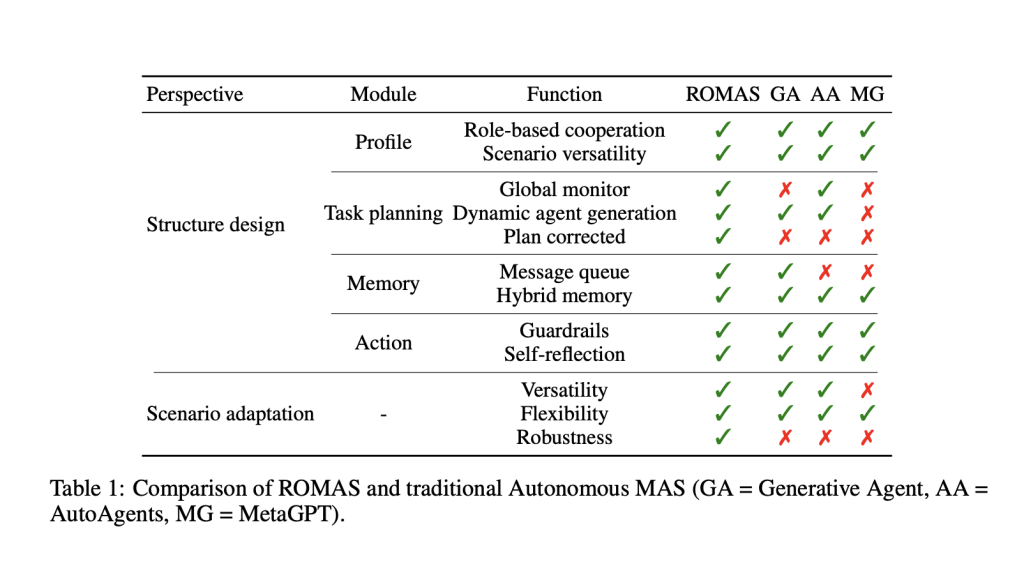

Multi-agent systems (MAS) are pivotal in artificial intelligence, enabling multiple agents to work collaboratively to solve intricate tasks. These systems are designed to function in dynamic and unpredictable environments, addressing data analysis, process automation, and decision-making tasks. By incorporating advanced frameworks and leveraging large language models (LLMs), MAS has increased efficiency and adaptability for various applications. However, enhancing their ability to handle real-world complexities remains a significant challenge.
A persistent issue in traditional MAS is their limited flexibility and adaptability. These systems often struggle with dynamic task requirements, relying on rigid task allocation and predefined unsuitable procedures for changing conditions. This rigidity increases the likelihood of errors and limits the system’s ability to recover effectively when deviations occur. Moreover, the lack of integrated mechanisms for self-planning and error correction exacerbates these inefficiencies, leading to wasted resources and suboptimal performance in complex scenarios.
Existing methods for MAS development include frameworks such as LangChain and AgentScope, which provide task allocation and development tools. While these frameworks facilitate the creation of agents and streamline deployment, they are limited by their inability to manage diverse data scenarios or provide robust solutions for advanced analytics. For example, traditional MAS systems like MetaGPT and AutoAgents lack global monitoring mechanisms and flexible agent generation, rendering them ineffective for tasks requiring dynamic adjustments and comprehensive error correction during execution.
Researchers from Ant Group and JD Group have introduced ROMAS, a Role-Based Multi-Agent System designed to address these limitations. ROMAS is built on the DB-GPT framework and incorporates role-based collaboration, enabling agents to take on specific roles such as planners, monitors, and workers. This innovative system facilitates real-time task monitoring, adaptive error correction, and low-code development. ROMAS enhances efficiency and scalability in database monitoring and planning tasks by supporting seamless deployment across various scenarios.
The ROMAS methodology emphasizes adaptability and robustness through its three operational phases: initialization, execution, and re-planning. In the initialization phase, the system divides tasks into subtasks and assigns them to specialized agents, each with distinct roles like data extraction, retrieval, and analysis. During execution, agents collaborate to complete tasks based on predefined strategies. A self-monitoring mechanism allows agents to identify and address errors dynamically, with unresolved issues escalated to a monitor for further analysis. The re-planning phase refines strategies using insights from the previous phases, ensuring alignment with the system’s objectives. The DB-GPT framework underpins ROMAS with powerful database handling, memory categorization, and self-reflection capabilities, allowing for effective task completion even in complex environments.
The researchers conducted extensive evaluations to demonstrate ROMAS’s performance, using datasets like FAMMA and HotpotQA to test its capabilities in domain-specific and general scenarios. On the FAMMA dataset, ROMAS achieved a success rate of 81.68%, while on the HotpotQA dataset, it reached 85.24%. These results highlight its superior performance to other MAS systems, including Generative Agents and AutoAgents. Marked features like the monitor mechanism and memory categorization contributed significantly to this success. The study also revealed that ROMAS reduced development complexity, with code volume decreasing to 1,500 rows compared to 2,500 rows in LangChain and 1,800 in AgentScope. Further, ROMAS demonstrated an average query processing time of 12.23 seconds, significantly faster than its counterparts.
Key findings include ROMAS’s ability to address pipeline and logical errors effectively. For instance, the system’s error correction mechanisms reduced error impact rates by 22.66% on average, showcasing its robust problem-solving capabilities. Integrating advanced memory mechanisms and the DB-GPT framework enhanced task efficiency by enabling seamless transitions between operational phases. These features improve system reliability and ensure that ROMAS maintains high adaptability across diverse scenarios.
In conclusion, ROMAS represents a significant advancement in multi-agent systems by addressing the critical limitations of traditional frameworks. Developed by Ant Group and JD Group researchers, the system leverages role-based collaboration, self-monitoring, and low-code deployment to streamline database monitoring and planning tasks. ROMAS has demonstrated superior performance through extensive evaluations, offering a scalable and efficient solution for complex analytical challenges. This innovation paves the way for further advancements in intelligent multi-agent systems and their applications.
Check out the Paper. All credit for this research goes to the researchers of this project. Also, don’t forget to follow us on Twitter and join our Telegram Channel and LinkedIn Group. Don’t Forget to join our 60k+ ML SubReddit.
The post This AI Paper Introduces ROMAS: A Role-Based Multi-Agent System for Efficient Database Monitoring and Planning appeared first on MarkTechPost.
Source: Read MoreÂ

 Trending: LG AI Research Releases EXAONE 3.5: Three Open-Source Bilingual Frontier AI-level Models Delivering Unmatched Instruction Following and Long Context Understanding for Global Leadership in Generative AI Excellence….
Trending: LG AI Research Releases EXAONE 3.5: Three Open-Source Bilingual Frontier AI-level Models Delivering Unmatched Instruction Following and Long Context Understanding for Global Leadership in Generative AI Excellence….